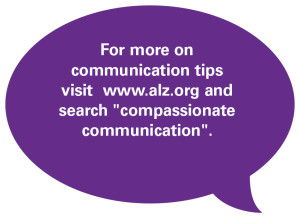Alzheimer’s Basics: Compassionate Communication
 We all have challenges from time to time coming up with the right word for something or trying to make ourselves understood. For our friends and family members with Alzheimer’s or a related disorder, this is a constant struggle.
We all have challenges from time to time coming up with the right word for something or trying to make ourselves understood. For our friends and family members with Alzheimer’s or a related disorder, this is a constant struggle.
Coming up with the right word, sharing one’s thoughts and feelings and understanding what others are saying are all impacted by dementia to varying extents. Learning compassionate communication will significantly heighten quality of life for
everyone involved.
If I have Alzheimer’s you can help me best if you:
Don’t test my memory.
If I have Alzheimer’s or dementia, chances are I have some memory loss. Asking me whether I remember an event, person or experience can lead to embarrassment and frustration. Avoid quizzing your loved one with Alzheimer’s to see if they remember close friends and family members. Instead, provide proactive reminders of names and relationships, for example “Hi Mom, it’s your daughter Liz. I am here to take you to lunch today.”
Don’t argue, correct, contradict, confront, blame or insist.
This is probably one of the hardest tips to follow. Before Alzheimer’s comes along, we are able to challenge one another and point out “reality” in a reasonable way. We can explain our point of view, compromise and move forward. With dementia however, the affected person’s ability to reason is reduced. They are less likely to be convinced that their view of reality isn’t accurate. Often Alzheimer’s and dementia impacts one’s insight, making it impossible for the person to recognize their weaknesses and changes.
Focus on the present or the future.
As dementia progresses, remembering past events becomes increasingly difficult. Focusing on the present or future means that if I have dementia and I state I am hungry, don’t argue or tell me I ate an hour ago. Instead, say, “Wow, you are hungry today,” and offer a snack or set a time to eat soon.
Reduce anxiety.
Open-ended questions such as “Where shall we go?” “What do you want to eat/wear/do?” are surprisingly complex and create anxiety. Instead, give a choice between two items or direct their choice: “You look great in the red blouse. Would you like to wear that today?”
Remember that it can be unsettling to be confused.
Reassurance goes a long way. Continually offer support and comfort, letting the person you care for know that you are there to help.
Helpful information related to this story:


















Hello, my mom has early on set Alzhiemers she is 55 and was diagnosed about 4 years ago she is progressing fast I am the one who takes care of her she lives with my husband and myself and 5 kids. I help her get her clothes every morning she b chooses what she wants to wear and takes a shower and every morning she gets mad at me and tells me that’s not what she picked out that is not hers it’s ugly and blames me. Its very hard not to get frustrated especially while I’m tired because I wake up with her through the night and am taking care of my 5 children also. My Husband is very supportive but does not help do the dressing and undressing that is just me of course. Is there any ideas that can help I try bringing 2 different out fits to the bathroom she likes but b ahebstill gets mad gets calls names and tells me this isn’t hers or what she picked out. Is there any advice pleaas please every morning she is crying and cussing and that is not her at all she never cusses and called names because her clothes are not what she picked out even tho they are exactly what she picked out. Thank you for any advice or suggestions
Hi Michelle, please give us a call at 800.272.3900 so you can speak to one of our helpline representatives. They should be able to help point you to resources and give you ideas to help with your situation.
Hi Michelle, please call one of our helpline representative for help and guidance at 800-272-3900. There are many ideas and resources they should be able to point you to.